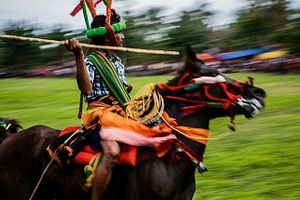Sumba is a remote island in the east of Indonesia. Early each year, in February or March, villagers from the island’s western province take to their horses to stage a mock battle of more than 50 men that entails throwing wooden spears at their opponents while on horseback. It’s all part of a centuries-old harvest festival known as Pasola.
The night before the battle, the Sumbanese gather in the village at dusk and prepare offerings for their ancestors. The next morning, before dawn, the villagers go to the nearby shore, carrying buckets and nets to collect the multicolored sea worm, which appear only once each year. Local shamans read the sea worm to divine the harvest for the year ahead.
This is followed by feasting – on pigs, dogs and chickens – and preparations for battle. The rest of the villagers form a circle as the two groups on horseback issues taunts at each other.
Then the attack begins, with the highly skilled horsemen riding bareback and flinging their spears at their opponents. A skilled rider can duck an incoming spear; the very best of them catch the spear in mid-flight. For the less agile, the spears, though blunted, can spill blood, which the Sumbanese believe will fertilize the land and produce a better harvest.
Finally, the joust ends, with a ritual reconciliation.















































